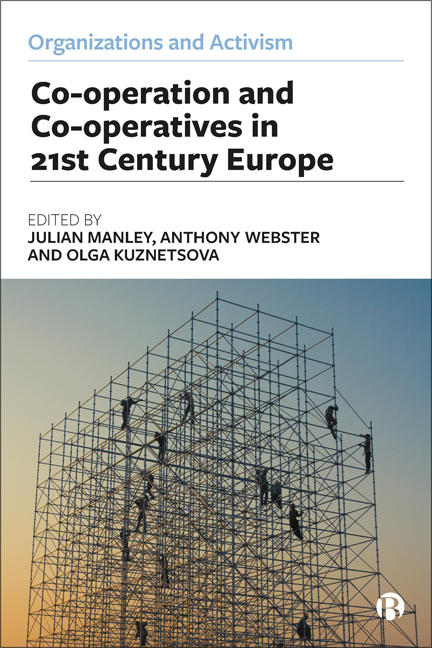Book contents
- Frontmatter
- Dedication
- Contents
- Series Editors’ Preface
- List of Figures and Tables
- List of Abbreviations
- Notes on the Contributors
- Acknowledgements
- Foreword
- 1 Introduction: European Co-operativism in a Changing World
- PART I Seeds: Identifying the Space for Co-operatives in Addressing Social Challenges
- PART II Bridges: Co-operative Culture and Education
- PART III Growth: The Preston Model, Co-operation and Community Wealth Building
- Index
13 - Possibilities and Challenges of the ‘Sorachi Model’: Learning from Preston’s Attempts to Rebuild the Region
Published online by Cambridge University Press: 28 March 2024
- Frontmatter
- Dedication
- Contents
- Series Editors’ Preface
- List of Figures and Tables
- List of Abbreviations
- Notes on the Contributors
- Acknowledgements
- Foreword
- 1 Introduction: European Co-operativism in a Changing World
- PART I Seeds: Identifying the Space for Co-operatives in Addressing Social Challenges
- PART II Bridges: Co-operative Culture and Education
- PART III Growth: The Preston Model, Co-operation and Community Wealth Building
- Index
Summary
Introduction
This chapter explores whether it is possible to revive the exhausted region of Sorachi (Sorachi, 2022), located in the centre of Hokkaido, an island in the northern part of the Japanese archipelago, by adopting insights from the Preston Model (Preston Model, 2022), a regional revitalization program currently underway in Preston, England. The aim is to evaluate the universal value and potential of the Preston Model to transcend regional and national boundaries.
The Preston Model, which has been attracting attention in the UK in recent years, is characterized by a simple mechanism to ‘keep money circulating within the region and keep it from flowing out’. The concept of ‘keeping the money circulating within the region’ has already been advocated by many researchers, and some trial-and-error efforts have already begun to put it into practice, especially through the experiment of introducing local currencies, such as the Bristol pound (Johnson and Harvey-Wilson, 2018; Marshall and O’Neill, 2018). However, the Preston Model is groundbreaking and significant in that it has proposed and put into action a concrete place-making system firmly linked to cooperative values and visions (Manley and Whyman, 2021). As shown in Chapter 11 of this volume, key elements include persuading anchor institutions to buy services locally and in smaller contracts, as well as a concerted effort to promote the creation of local cooperatives to meet anchor institution need and other local demands.
Although the potential for this model is gaining traction in the UK, we need to consider the following question: Can this British model be applied to the regeneration of regions on the other side of the world, where the social environment is completely different? In other words, this is both a question and consideration of its universality and an exploration of the potential of cooperative place-making (Webster et al, 2021). If a version of the Preston Model were to be applied to the revitalization of a former coal-producing region in Japan such as Hokkaido which faces economic and social decline, various obstacles would be encountered. First, transferring a model designed to meet the needs of a locality in one part of the world to a place where the sociocultural environment is completely different will inevitably demand at the very least, considerable adaptation.
- Type
- Chapter
- Information
- Co-operation and Co-operatives in Twenty-first-Century Europe , pp. 234 - 250Publisher: Bristol University PressPrint publication year: 2023



